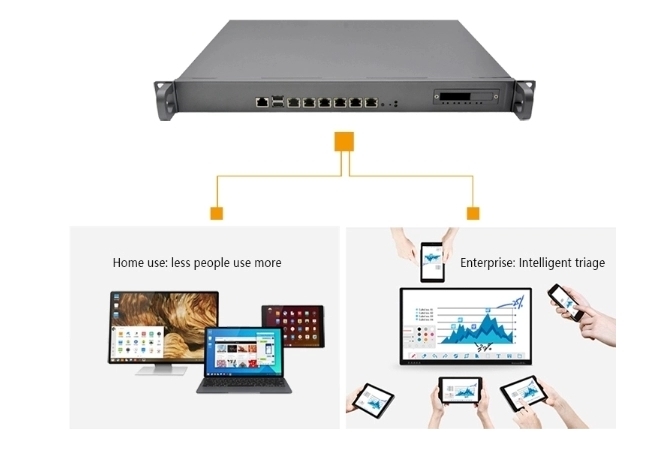In an era where cyber threats are increasingly sophisticated, the importance of robust security measures cannot be overstated. Firewall PCs, particularly in industrial settings, serve as a critical line of defense against unauthorized access and data breaches. This article delves into the myriad benefits of firewall PCs, emphasizing their role in ensuring security, protection, and reliability for organizations.
Understanding Firewall PCs
What is a Firewall PC?
A Firewall PC is a specialized computer that integrates firewall technology with industrial computing capabilities. These devices are designed to protect networks by filtering and monitoring incoming and outgoing traffic based on predetermined security rules. By leveraging advanced features, firewall PCs not only safeguard sensitive data but also enhance the overall integrity of industrial systems.
Core Functions of Firewall PCs
Prevent External Network Attacks: Firewall PCs act as a barrier against cyber threats by identifying and blocking malicious traffic before it can penetrate the network. This proactive approach significantly reduces the risk of data breaches and system compromises.
Protect Internal Data Security: Beyond external threats, firewall PCs implement stringent access controls to safeguard internal data from unauthorized access. This is crucial for maintaining the confidentiality and integrity of sensitive information.
Monitor Network Traffic: These devices continuously analyze network traffic patterns, enabling real-time detection of anomalies that may indicate a security breach. Such monitoring capabilities empower organizations to respond swiftly to potential threats.
Implement Access Control: By managing user access requests according to established security policies, firewall PCs ensure that only authorized personnel can interact with critical systems. This minimizes the risk of insider threats and enhances overall security posture.

Advantages of Using Firewall PCs
Enhanced Security Measures
Firewall PCs provide multi-layered security solutions that go beyond traditional firewalls. They incorporate features such as:
Deep Packet Inspection (DPI): This technology examines the contents of data packets in real time, allowing for more informed decisions about what traffic to allow or block. DPI helps identify hidden threats that might evade standard filtering techniques.
Sandboxing: By testing files in an isolated environment before they enter the main system, sandboxing prevents potentially harmful software from executing on critical infrastructure.
Integrated Threat Prevention: Many firewall PCs come equipped with advanced threat prevention capabilities that identify and neutralize attacks before they can cause damage, thereby enhancing overall network resilience.
Reliability in Industrial Environments
Industrial settings often face unique challenges due to harsh operating conditions. Firewall PCs are designed to withstand these environments while maintaining high performance levels. Key benefits include:
Rugged Design: Many firewall PCs feature ruggedized designs that protect against dust, moisture, and extreme temperatures, ensuring reliable operation in challenging conditions.
High Availability: These systems are built for continuous operation, minimizing downtime and ensuring that critical processes remain uninterrupted even during maintenance or upgrades.
Cost-Effectiveness
Investing in firewall PCs can lead to significant cost savings over time:
Reduced Risk of Data Breaches: The financial implications of a data breach can be devastating. By preventing unauthorized access and protecting sensitive information, firewall PCs help organizations avoid costly incidents related to data loss or regulatory penalties.
Streamlined Security Management: With integrated features that consolidate multiple security functions into one device, organizations can reduce the complexity and cost associated with managing separate security solutions.
Application Prospects for Firewall PCs
As industries increasingly adopt digital technologies, the demand for robust cybersecurity solutions continues to grow. Firewall PCs are poised to play a pivotal role in various sectors:
Manufacturing: In manufacturing environments where operational technology (OT) is integrated with information technology (IT), firewall PCs help secure critical infrastructure from cyber threats while ensuring compliance with industry regulations.
Energy Sector: The energy sector faces unique cybersecurity challenges due to its reliance on interconnected systems. Firewall PCs provide essential protection against attacks that could disrupt service delivery or compromise safety.
Healthcare: With sensitive patient data at stake, healthcare organizations must prioritize cybersecurity. Firewall PCs safeguard electronic health records (EHRs) and other critical information from unauthorized access while complying with regulations like HIPAA.
Transportation: As transportation systems become more digitized, they become attractive targets for cybercriminals. Firewall PCs enhance the security of transportation networks by protecting against potential disruptions caused by cyberattacks.
Conclusion
The integration of firewall technology into industrial computing products represents a significant advancement in cybersecurity measures. Firewall PCs offer enhanced security features that protect against external threats while safeguarding internal data integrity. Their reliability in harsh environments makes them indispensable in various sectors, from manufacturing to healthcare.
As organizations continue to navigate the complexities of digital transformation, investing in firewall PCs will not only bolster their cybersecurity posture but also ensure operational continuity and compliance with industry standards. In a world where cyber threats are ever-evolving, adopting robust solutions like firewall PCs is not just beneficial; it is essential for securing the future of industrial operations.
Maximizing Network Performance: The Role of Firewall PC in Optimizing Data Transfer


